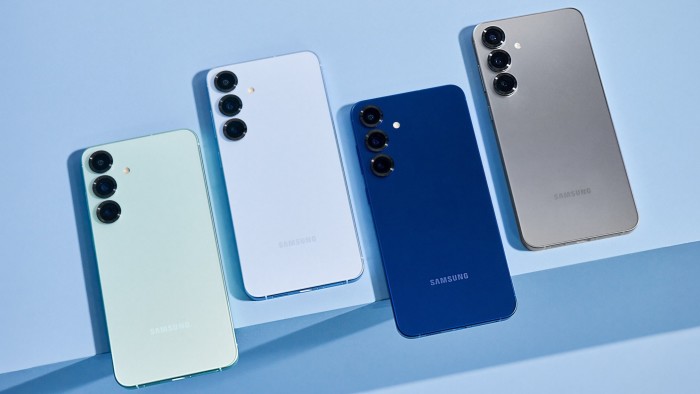Unlock the Editor’s Digest for free
Roula Khalaf, Editor of the FT, selects her favourite stories in this weekly newsletter.
Samsung is stepping up its push to grab a bigger share of the US smartphone market from Apple, as the South Korean tech giant launched its latest artificial intelligence-powered smartphone on Wednesday.
The company unveiled the S25 at Samsung’s annual “Unpacked” event in San Jose, California, marking its latest push to capitalise on its first-mover advantage over Apple, which has been slower to roll out generative AI features across iPhones.
TM Roh, president of Samsung’s mobile division, said the S25’s new AI operating system, built on Google’s Gemini large language models and chips from Qualcomm, would give it an advantage in the US smartphone market, where the iPhone maker dominates sales.
“The AI ecosystem that we are developing with Google is very well-positioned in the US market,” said Roh.
It comes as both Samsung and Apple bet on AI technology to boost demand for their smartphones, following a year of relatively flat sales globally.
Samsung launched its first AI smartphone, the S24, in January last year. Apple introduced initial AI features — known as Apple Intelligence — in October, followed by an integration of Siri with OpenAI’s ChatGPT in December.
Apple currently holds the largest share of the US smartphone market, at around 53 per cent of shipments in the quarter to the end of September, compared with Samsung’s 23 per cent, according to Counterpoint Research.
The launch comes at a critical point for Samsung, which has been hit by a series of failures at its semiconductor division. Its shares have slumped more than 30 per cent over the past six months, prompting the group to issue a rare apology in October for its poor performance.
Samsung’s decision to opt for Qualcomm application processors in the S25 instead of its own in-house Exynos series marks the latest setback for its chip division, which accounts for 60 per cent of operating profit.
The company is also coming under pressure from Chinese rivals in the fast-growing segment for foldable phones.

Roh said the S25 would help users move on from the era of touchscreens, where people use a suite of apps on a daily basis, to one dominated by an AI voice assistant that can carry out actions across the device on the user’s behalf.
Samsung said the S25 operating system offered faster responses to voice and text instructions, personalised to the user based on data stored locally on the device.
Qualcomm’s Snapdragon 8 Elite chips are being used for the first time across all three models of the S25, bringing a 40 per cent performance boost for its neural processor, the “brain” powering AI, according to Samsung.
WhatsApp and Spotify are among the first third-party apps to be able to interact with the revamped AI assistant. Roh said the aim was to build a large ecosystem of Android apps that Gemini can interact with.
He added that the S25 would offer Google Gemini in 46 different languages. Apple, which uses a combination of its own LLMs and OpenAI’s ChatGPT, has so far rolled out Apple Intelligence only in local variants of English, with more planned by April.
But the extent to which generative AI will shake up the smartphone industry remains unclear, according to analysts.
Technology analysis firm Canalys said on Monday that consumers were becoming more aware of the new features, which is good news for Samsung “given its global availability and first-mover advantage”.
But a December survey of consumers with AI-enabled smartphones by price comparison site SellCell found that a large majority of both Apple and Samsung users saw the initial features adding “little or no value”.
Additional reporting by Christian Davies in Seoul



